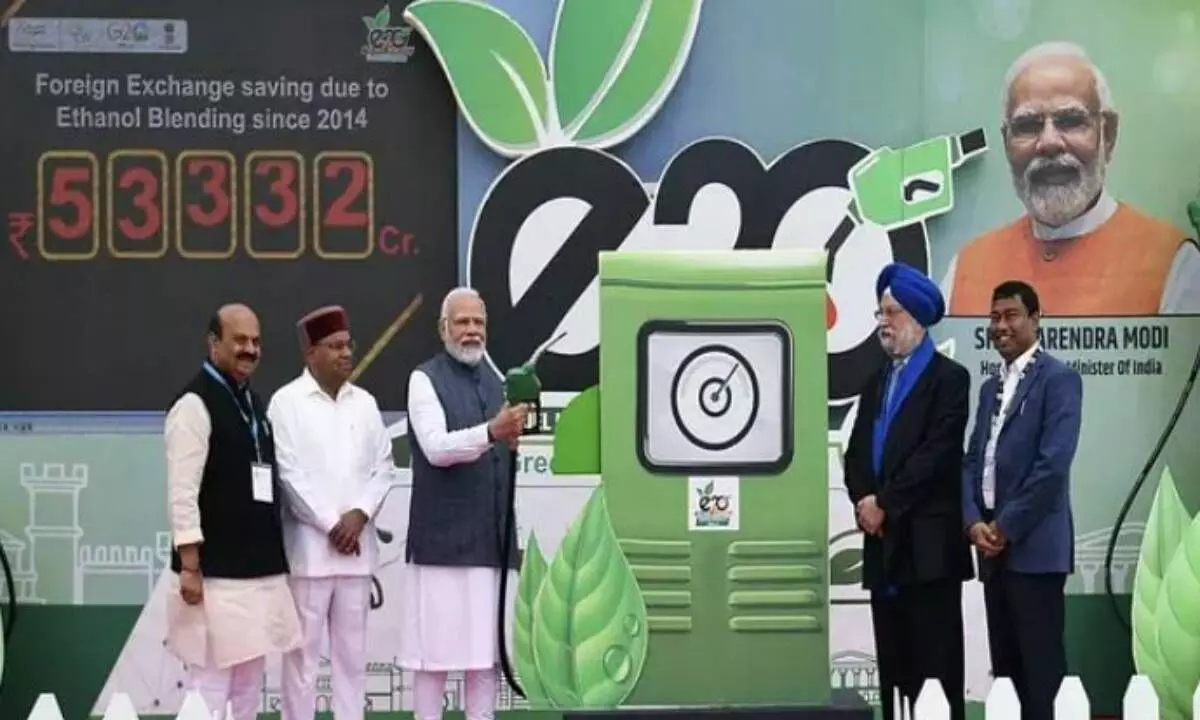Can ethanol reduce petrol prices? World waits with bated breath
Prices differ in countries because of various taxes and subsidies for gasoline
image for illustrative purpose

India is the world’s third largest energy consuming nation and a significant part of the energy requirement is met through oil, which continues to rely largely on imports. India’s share in global energy consumption is set to double by 2050.
A rising energy demand and high reliance on import poses significant energy security challenges. It also leads to massive foreign currency outflow. Further, excessive use of fossil fuels leads to higher carbon emissions and associated health concerns.
Domestically produced ethanol is a potential opportunity to reduce reliance on oil imports by blending it with conventional fossil fuels for consumption. India started blending ethanol in petrol on a pilot basis in 2001 by as a byproduct during the process of making sugar from sugarcane. However, despite potential, no significant progress was made under the ethanol programme and the production of ethanol remained stagnated until recently when transformative reforms were carried out. The results are set to help not only the economy but transform farmers’ income and recharge the rural economy.
Under Ethanol Blending Programme (EBP), Oil Marketing Companies (OMCs) have paid sugar mills nearly `81,796 crore for ethanol supplies in the last seven years, which has helped mills to clear farmers’ dues. Additionally, decision has been taken to buy damaged and surplus food grains for ethanol production, ensuring price value for surplus grain stock as well as accommodating the fresh season crop to meet the EBP target. Rising ethanol production is helping sugar mills in making faster payments to farmers and in settling nearly 75 per cent of current season’s cane arrears.
The cumulative foreign exchange impact due to EBP Programme is estimated over `53,894 crore during 2014 to November 2022.
One crore litres of ethanol blended petrol can save around 20,000 tons of carbon dioxide emission. Greenhouse gas emissions due to the EBP Programme were reduced by 318.2 lakh tons from 2014 to November 2022.
The IDR Act implementation enabled State governments to avoid complicated documentation procedures and conduct pro-business activities like e-approvals, online permits, electronic locking and GPS tracing of vehicles carrying ethanol, thereby shortening the overall process and reducing time to help the business.
By 2025, at 20% blending level, ethanol demand will increase to 1016 crore litres. Therefore, the worth of the ethanol industry will jump by over 500% from around `9,000 crore to over `50,000 crore.
Union Minister Nitin Gadkari has proposed to bring down the price of petrol to Rs 15 per litre by blending 60 per cent ethanol and 40 per cent electricity. The import amounts to Rs 16 lakh crore, this money will go to the homes of farmers instead.
The Union Government has advanced the target with 20 per cent ethanol blending in petrol (also called E20) to 2025 from 2030. This measure is aimed at reducing the country’s oil import bill and Co2 pollution. This new initiative is also part of measures to improve energy security and self-sufficiency measures.
The Centre has released an expert committee report on the ‘Roadmap for Ethanol Blending in India by 2025’. It proposes a gradual rollout of ethanol-blended fuel to achieve E10 fuel supply by April 2022 and a phased rollout of E20 to April 2025.
Enhanced production of 1G ethanol from various feed-stocks will help in achieving blending targets of ethanol with petrol apart from promoting ethanol as an indigenous, non-polluting, environment friendly and virtually inexhaustible fuel.
The average price of ethanol around the world is $1.27 per litre. However, there is a substantial difference in the price structure among countries. As a general rule, richer countries have higher prices while poorer countries and those producing and exporting oil have significantly lower prices. One notable exception is the U.S. which, despite being economically advanced, has low gas prices. The differences in prices across countries are due to the various taxes and subsidies for gasoline. All countries have access to the same petroleum prices of international markets but then decide to impose different taxes.
As a result, the retail price of ethanol is different. On the graph, prices for the countries indicated with a * are updated on a weekly basis. The prices for the other countries are updated on a monthly basis because they have regulated fuel markets and prices do not change as frequently.

